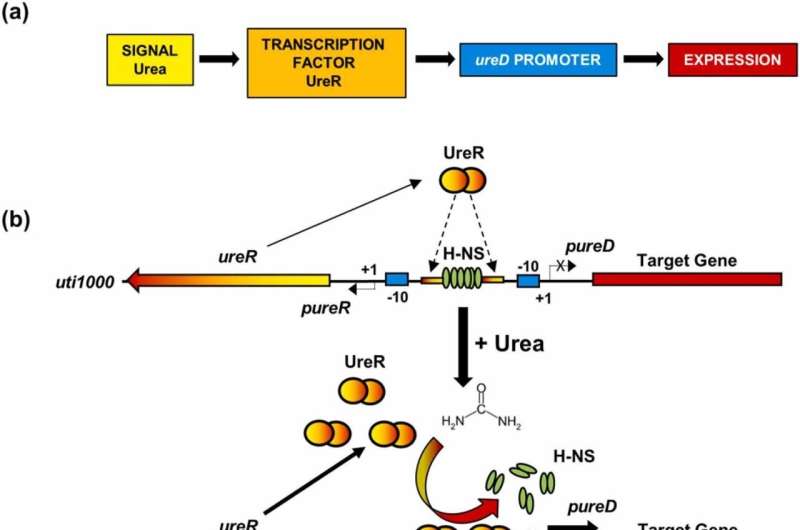Urine could play key part in future biotech systems

A common chemical found in urine can be used to kick-start large-scale production of proteins such as hormones and antibodies used by biotech companies.
Researchers at the University of Birmingham and Aston University, in the U.K., have developed a system that uses urea to trigger the production of these proteins in the large quantities needed by the biotech industry.
Typically, in this process, small pieces of DNA are introduced into bacteria such as E.coli to persuade them to overproduce certain proteins. It is a well-understood technology that was first developed in the 1970s. Overproduction, however, is typically triggered by "inducer" molecules, which can be costly, and often need careful handling, such as refrigeration.
By using urea instead, the researchers have developed a method that is cheaper, more straightforward, and uses easily accessible materials.
In a new study, published in New Biotechnology, the team investigated both purified urea and the urea contained in common garden fertilizers. They showed that similar results could be achieved using either source.
Co-author Professor Steve Busby, in the University of Birmingham's School of Biosciences, said, "Our aim is to make this technology available to biotech companies who want to explore how to optimize their processes and also keep their costs down."
The team also showed it was possible to fine-tune the amounts of protein triggered by the urea molecule, by varying the concentrations used. This is important to avoid harming or exhausting the host bacteria. They found it was possible to optimize production to quantities similar to those produced using medium-strength promoters currently used as standard by the biotech industry.
The study builds on earlier work in which the team successfully demonstrated that nitrate, a cheap, stable and abundant inorganic ion, could also be used as a trigger. Nitrate is commonly found in many commercial fertilizers and even in some garden fertilizers, meaning that it is always readily available, even in areas where other types of promoter chemicals might be inaccessible.
Co-author Dr. Joanne Hothersall, also in the School of Biosciences, added, "Both urea and nitrate will be much more readily available, and easy to use, in locations where infrastructure limits access, for example where maintaining a cold supply chain is challenging. We hope these new approaches will open up new avenues of research for biotech industries."
More information: Joanne Hothersall et al, New vectors for urea-inducible recombinant protein production, New Biotechnology (2022). DOI: 10.1016/j.nbt.2022.10.003
Provided by University of Birmingham





















